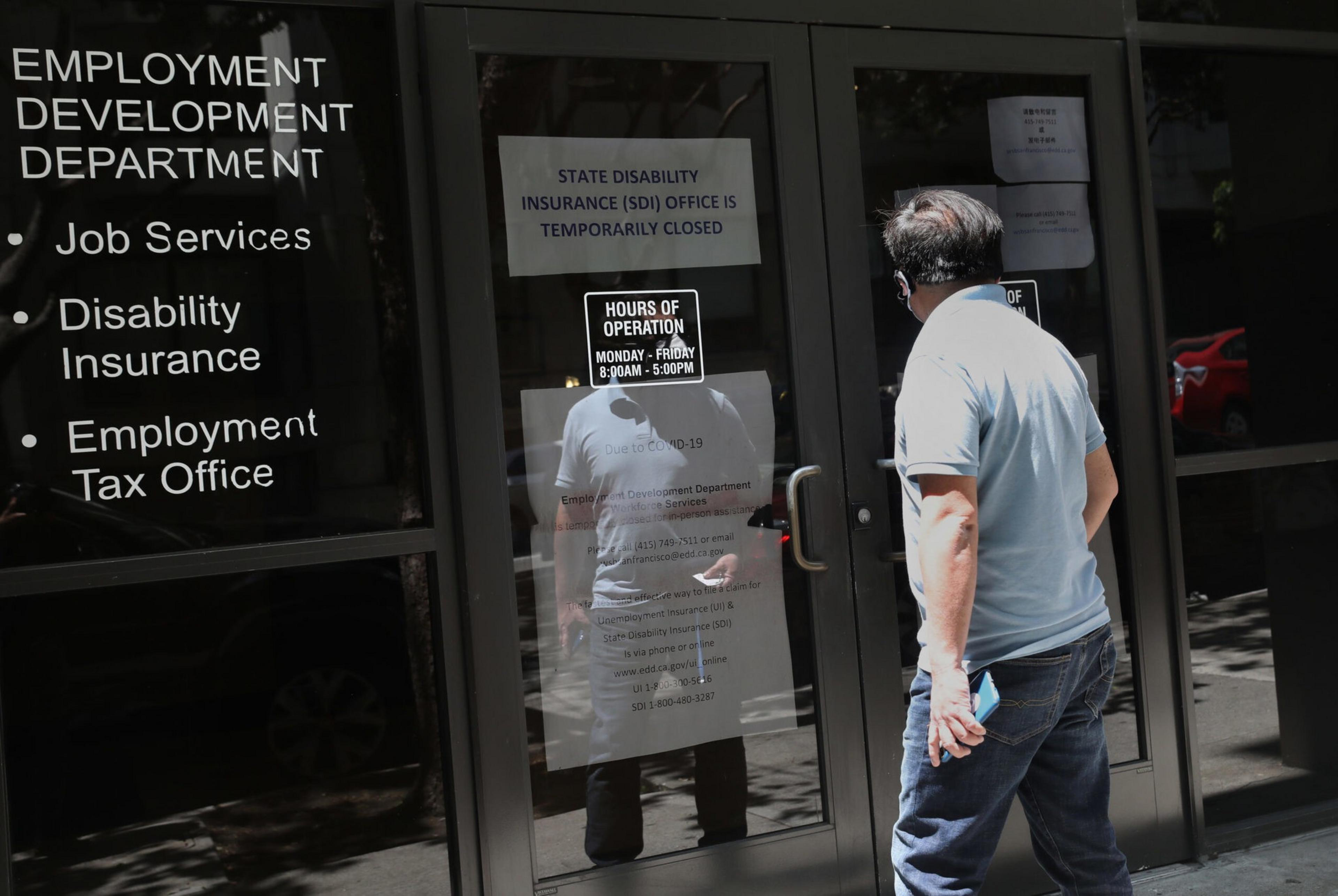Ashley Yao was thinking about quitting her job at DocuSign in December, when she received an ominous calendar invitation.
“The exact same day, I checked my email—I got invited to this really vague, 15-minute all-hands meeting,” Yao said. “I kind of was like, ‘Oh, wait, the same thing happened in the fall,’ where a bunch of people from my team got laid off.”
DocuSign laid off Yao that day, along with hundreds of other employees (opens in new tab) from its San Francisco team—the second major round of layoffs the administrative tech company carried out in 2022.
READ MORE: Father and Son Were Both Laid Off From Bay Area Tech Jobs. It Was a Bonding Experience
Yao joins the more than 140,000 people (opens in new tab) who have been let go by tech companies in the last 12 months, many of whom were based in the Bay Area. Though these workers may have held high-paying positions and collected cushy severance packages on their way out, the nonstop deluge of Big Tech layoffs has many in the industry wondering: What comes next?
Four Bay Area folks—laid off from DocuSign, Airtable, Meta (formerly Facebook) and Mad Mobile—found their way from tech companies’ doors to a Taiwanese tea company, AI startups and, for one industry veteran, a Napa Valley winery.

From Big Tech to Scrappy Startup
For Yao, the news of her layoff was, ironically, a relief.
The 24-year-old had grown disillusioned with her work as an account executive and had been searching for a way out well before DocuSign’s layoffs. Yao now runs a tea startup with her business partner and boyfriend, Kyle Gillaspy, a product manager at Oracle.
“It didn’t take me too long to realize, ‘Oh, I don’t think this is what I want to do with the rest of my life,’” Yao said. “I am a Taiwanese immigrant, I love cooking and I would always have family nights and dinner clubs at my place every Sunday with my closest friends.”
Yao combined her passions for cooking and heritage in her company, Kace (opens in new tab), which produces unique drinks akin to the Bay Area’s popular boba tea offerings. With flavors ranging from passion fruit lychee to apple jasmine, Yao says Kace plans to launch its drinks soon, having recently secured a Taiwanese manufacturer.

Today, Yao is one of the many laid-off tech workers who found a different path from the industry she left behind. But it wasn’t easy getting there, and her status as a foreign-born worker from Taiwan with citizenship in Canada meant that being laid off put her work visa in jeopardy, even before she left DocuSign.
“Locally, most of my international friends haven’t been laid off—if they have, they might have to leave the country or find another job within [60] days,” Yao said. “They have a pretty strict turnaround time for maintaining their visa status.”
Highly skilled foreign workers based in the U.S. often hold what’s called an H1-B visa, which has a grace period of 60 days (opens in new tab) to find a new employer, or else risk deportation. Roughly 65,000 of these visas (opens in new tab) are granted yearly, and nearly 70% of approved (opens in new tab)applications in 2021 were for “computer-related occupations,” according to U.S. Citizenship and Immigration Services.
Yao, for her part, will not be deported immediately because of her Canadian citizenship (opens in new tab). She is applying for an innovator’s visa as well.
‘Best Thing That Ever Happened to Me’
Ashley Yao’s route from Big Tech to tea company is certainly unique, but other former tech workers are finding increased opportunities in the startup sphere, especially in artificial intelligence.
Software engineer Stephen Campbell made the leap from his job to entrepreneurial tech in December, after being laid off from Airtable, a cloud productivity company. The company let go of 20% of its workforce (opens in new tab) in early December, including the 24-year-old Campbell, who had been with AirTable for 18 months.
But it wasn’t all bad, as he went on to found two startups and one of the Bay Area’s many AI social collectives. Campbell’s current company, Revamp AI, aims to use generative tech to help small businesses analyze and use data to grow their companies. He co-founded Revamp with longtime friend Pierce Kelaita, another engineer who was recently laid off by Meta.
“Getting laid off, honestly, is the greatest thing that’s ever happened to me,” Campbell said. “It’s just absolutely a catalyzing moment in my life, and I’m incredibly thankful I was laid off.”
READ MORE: AI Workers Suddenly Most Popular Kids in San Francisco as Industry Parties Explode

Though the startup is currently looking for funders, the generous severance packages given to Campbell and Kelaita actually paid for the early months of their startup.
“It’s a big decision to quit your job and go full-time on the startup,” Campbell said. “When I was laid off, it was just fantastic because Airtable severance was extremely generous, and I’ve been able to support myself completely off of that. We’ve been bootstrapped up until this point—which was really great, because we haven’t had to take on early VC funding.”
A small subset of laid-off workers have managed to seed-fund their startups with severance monies, but it takes a certain amount of capital and guts to financially bet on oneself—especially in today’s volatile tech sector.
“It does take a very specific kind of person to be able to take the risk […] towards starting their own company,” TechCrunch editor Natasha Mascarenhas said in an interview with Yahoo (opens in new tab).
Navigating a Floundering Market?
This batch of laid-off employees is, in some ways, incredibly lucky to hop from unemployment right back into the world of entrepreneurship. Of the roughly 110,000 big tech workers that have been laid off this year, it’s possible that many may not actually go back to jobs in the tech industry, especially if recent economic conditions continue.
Nearly 60% of people with tech-focused jobs do not actually work in the tech industry, according to tech analytics firm CompTIA (opens in new tab). Industries like health care, education and finance employ thousands of tech workers, and may now pick up highly skilled workers who were laid off from bigger companies like Meta at the end of 2022.
“I contacted a few of my friends at Meta that were laid off, and the vast majority of them went on to have similar roles at smaller companies,” Kelaita said. “But my heart really, really goes out to everyone that’s looking for a job, since companies are scaling back on their hiring, their budget, all of that.”

San Francisco’s economy has only just started to show signs of damage from the layoffs. The city’s tech-heavy labor market maintained an extremely low unemployment rate through much of 2022, and the SF Controller’s Office consistently reported that new tech jobs would continue to outpace the rate of layoffs.
But economic conditions turned further southward recently, as the banking world suffered a major blow when Silicon Valley Bank (SVB) collapsed. San Francisco’s heavy reliance on tax income from commercial real estate has also started to raise alarm bells at City Hall, as hundreds of thousands of square feet sit empty Downtown.
In February, San Francisco saw its largest uptick in unemployed residents since the pandemic began three years ago. Layoffs are particularly relentless, with Amazon’s 9,000 company-wide layoffs affecting 400 SF-based workers in early March. Banking volatility narrowed the startup fundraising space, and SVB’s collapse threw SF-based First Republic Bank into hot water.
READ MORE: Why the Bay Area Should Be More Worried About First Republic
Despite all the warning calls, some laid off workers say the job market doesn’t feel that daunting—it’s just that the lucrative Big Tech jobs with perks, fat salaries and catered lunches might not be available anymore.
Kelaita’s father, Paul Kelaita, was laid off from Mad Mobile within months of when his son lost his job at Meta. But as an industry veteran who weathered the dot-com crash in 2000, the 2008 recession, the 2020 pandemic and today’s tech bloodbath, Paul says the recent woes are just part of the tech industry’s boom-and-bust cycles.

“Sometimes it feels like it’s history repeating itself with tech layoffs, because oftentimes you see the success meter for companies is how quickly they can hire and grow,” Paul Kelaita said. “But inevitably, it seems like that’s the beginning for layoffs in the future. It’s just numbers that they can’t sustain.”
In the nearly nine months since being laid off, Paul coded and published two apps on the Apple app store, and he’s currently enrolled in wine classes from his home in Napa Valley.
Editor’s Note: A previous version of this article did not clearly state the length of time between when Pierce Kelaita and his father lost their jobs.
